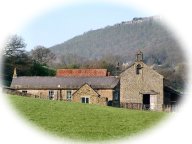Stocking Farm School - Calver and CurbarCompiled and edited by Rosemary Lockie, © Copyright 2004
The mill owner also summoned a doctor on a monthly basis to call to check the children's health with regard to "cotton fibres in the lungs". Olive, one of our contributors, born in the 1920's remembers being told about the school and place of worship when she was a young girl by men aged 70 and upwards, so placing the date of its use in the 1860s. She thinks the Mill owner must have been a true Christian fellow and quotes that, by contrast, the owner of Cressbrook Mill was evil, treating the children like dogs, literally working them to death and when the poor souls died, he didn't even give them a Christian burial. Instead, he waited till night time and buried the bodies near the mill. Calver Mill's owners employed a teacher to teach the children reading - the Bible was the preferred text. Brighter pupils only were to be taught to write, but there was no mention of Arithmetic: educational policy explicitly stated that: "We are of the opinion that it is more conducive to the welfare of our people to endeavour to make them enlightened Christians than wise in worldly knowledge; We do not want statesmen in our factories but orderly subjects". Whilst this might sound quite dreadful to us now, it might also be said that such education was a great deal better than nothing, and indeed, as indicated above, Calver Mill is now remembered as having treated their child-workforce very well. One such pupil must have been one of the brighter ones as he recorded a series of reminiscences in his later years. Thomas GODDARD of Curbar was born in 1849 and recorded that:- "The first school I attended was in a cottage in Worralds Yard taught by Mary Stone the wife of Rowland Stone. The next school I attended was one taught by Alice Elliss at the Top of the Green... My next school was the Stockin School, taught by Mr Barker. Church Services were held there then and the Sunday School and was the first Sunday school I attended... A Mr Cope was the minister and he left to be the Bishop of [omitted - Lichfield?] "I will remember Mr Stockdale who proceeded him coming the first time. I also remember Mr Salt coming for the first time I attended both Sunday School and Church in the Stockin until Curbar Chapel, Wesley Reform was built." Thomas then goes on to describe how he started work Calver Mill when he was 10 years old, for 2/- a week. He was encouraged to do so by his school mates, and he had asked his mother several times if he could go. When she'd said no, he'd taken the opportunity to ask her when she'd been sitting in a chair half-asleep, and as she nodded her head in her sleep he'd taken it for her assent, but "she never intended me to go". He began in "Nor Throstle room under Martin Rowland" but after a time some of his mates persuaded him to go to "the little mill in the mule room" and he left "Nor" without telling his overlooker. When he found out, he fetched Thomas back and "clouted me. that was how they treated the children in the early days of the factory system." At any rate, Thomas's early schooling resulted in him having a good 'hand', and a determination to record his experiences with a literacy and style which wouldn't be out of place today. His Journal opens philosophically... "The unexpected events in our journey through life... Lifes doors turns on small [h]inges, and great issues depends on what may appear trifling circumstances, how many people could till interesting stories of the little incidents and gradual degrees by which they came to what proved to be their lifes work... if the future had apeared before them like an open book, life might have appeared intolerable." ...and at the end, he records he wrote twelve other books. Titles include 'History of Calver Mill', 'A Ramble to Daisy Nook' and 'A Memoir of James Hilton Hulme and Cliff College'. It is not known what happened to these books, nor even whether they still exist. Other local children could attend the school by paying a penny a day, and Anglican church services were also held in the same part of the building as the schoolroom; the barn remaining licensed for the holding of divine service until All Saints Church, Curbar was consecrated in 1868. The National School (now Curbar Primary School) was opened 3 years later, in 1871. The school bell which was in the bell-cote at Stocking Farm (seen empty on the photograph above) is now to be found in the passage between the present day School and Schoolhouse. References: [2] The Journal of Thomas Goddard of Curbar, 1860 - extracts of which were shared with me by one of his descendants. Thomas was one of the founders of the Culcheth Military Band (the “Tall Hat Band”), taking the tradition of Brass Bands from Derbyshire to Manchester! The website has further information about Thomas, including a photograph. |
||||
